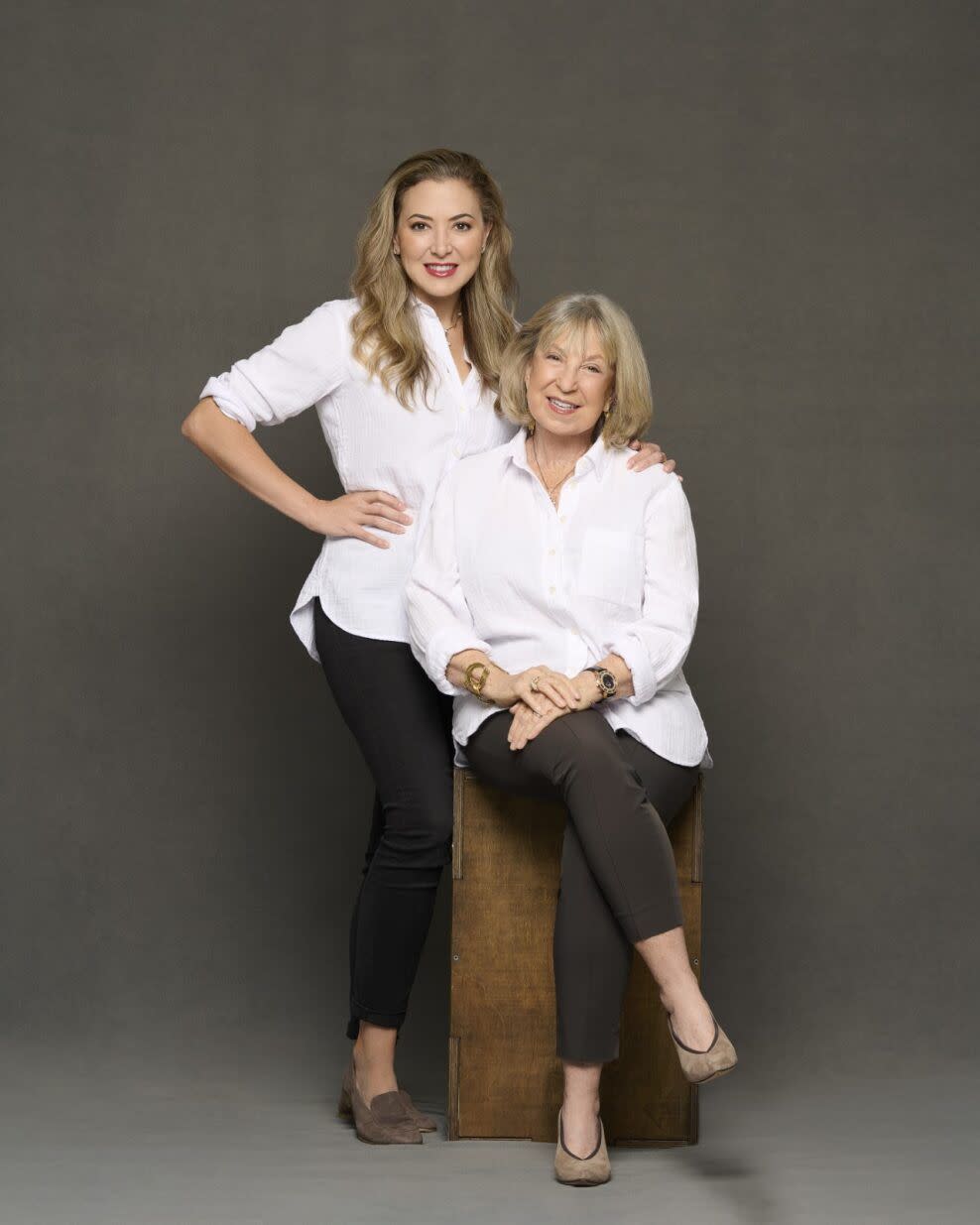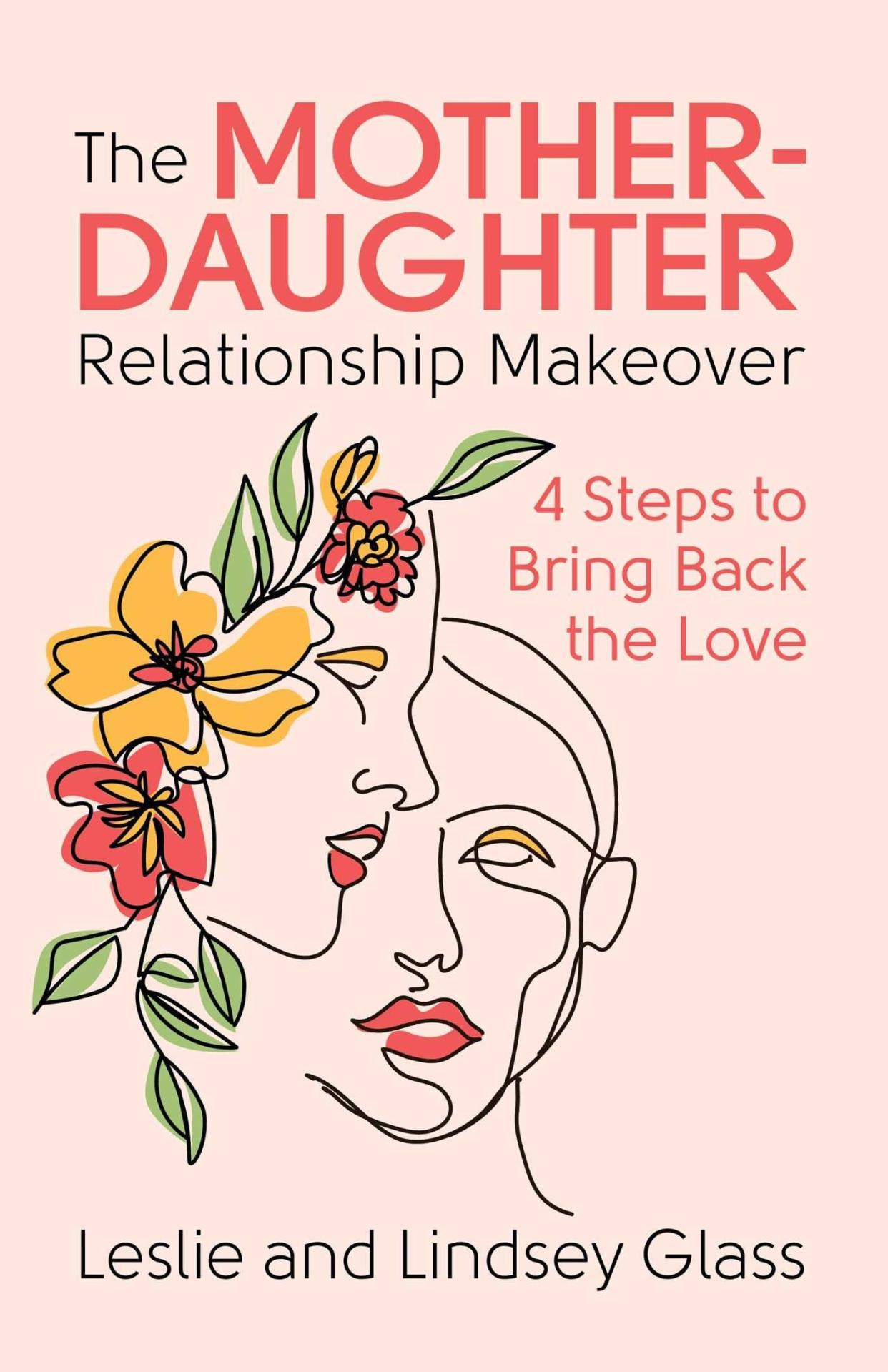Two Sides of a Major Mother-Daughter Fallout

"Hearst Magazines and Yahoo may earn commission or revenue on some items through these links."
Leslie Glass, 78, is a New York Times and USA Today bestselling mystery writer, documentarian, and journalist based in Florida. Her daughter, Lindsey Glass, 46, is a documentary filmmaker and author living in Los Angeles. Over the years, the mother and daughter have been both stiflingly close and painfully combative—and for several years, they cut each other off completely. This spring, they published The Mother-Daughter Relationship Makeover, a four-step guide to bringing the love back to this important bond. We sat down with them for a candid conversation about their complicated relationship, their wealthy but troubled family background, and how they finally achieved peace.
An early bond
Leslie: Lindsey was my miracle baby. After losing a baby at 25 weeks and having an ovary removed, I never thought I’d have a second child. I was so happy when she came into the world, a little sister for my 3-year-old son, Alex. But she didn’t come out of the womb robust—the first two and a half years of her life were spent in and out of the hospital with immune issues. I was terrified, and would pray everyday, Just let my children live to grow. That’s a terrible prayer to have. It made me very protective of her.
Lindsey: My mom was my favorite person in the world. She was always cooking something delicious or hand-sewing my clothes, and was so glamorous. My father was great but very hands-off—it was a different time. In many ways, it was an idyllic childhood, with summers at my grandfather’s house in Martha’s Vineyard, and ice-skating parties at Rockefeller Center, me and my mom in matching fur-trimmed jackets. While we didn’t fight when I was little, we were very codependent [unhealthily reliant on each other]; that started young.
Teenage tragedy
Leslie: When she was 12, Lindsey lost her grandfather. They had spent a lot of time together, and his death hit her hard. Later, her first boyfriend was killed, and then she lost a friend to suicide. All these devastating losses had a huge impact on her.
Lindsey: The grief I suffered sent me spiraling off track. At the same time, my mom’s writing career really blew up, and there was a lot of absenteeism as she traveled for book tours.
The New York scene
Leslie: At that time in New York, it was normal for kids to go drinking and clubbing. Lindsey soon became part of that scene, but I was a dumb mother, in a way—like most parents, I didn’t know what they were up to. I saw her getting thinner, and I worried about what she was eating and about her grades. But I had no idea she had a substance issue.
Lindsey: I was a prep school kid—we all had access to money and empty homes. I got caught up badly in the club kid scene and was skipping school and smoking pot. I really needed my parents, but instead of telling them that, I pushed them away. It got very combative. Mom and I started screaming at each other, and it really didn’t stop for 20 years.
Losing control
Leslie: By the time Lindsey left for college in 1996, I knew something wasn’t right, but I didn’t know how to fix it. Every time I would confront her, there would be a fight.
Lindsey: I was into club drugs—ecstasy and ketamine, as well as prescription drugs. I would drive home from college for the weekend, rail-thin and clearly unwell. Mom would be trying to feed me, but when you’re a drug user, the last thing you want is someone shoving a chicken in your face. She would keep questioning me about what was wrong, and we’d end up in brutal screaming matches, with me driving back to Baltimore instead of staying the weekend.
Rock bottom
Lindsey: By spring semester of junior year, I weighed 95 pounds, my hair was falling out, and I’d stopped attending classes. After overdosing, I called my mom on her birthday and told her I needed to rehab. It was actually a good moment—everyone was so relieved that there was an answer to what was wrong and that I was finally asking for help. But unfortunately, at 21 years old, I wasn’t ready to be sober for the rest of my life. I spent another eight years struggling with prescription pills and drinking. It wasn’t until the age of 30 that I attended a three-month outpatient program and finally became sober for good.
Rest and recovery
Leslie: As a writer, I said, “Lindsey, make art out of what is happening to you.” So we traveled the country and made two recovery documentaries, and we launched a website called Reach Out Recovery. I believed so strongly that we needed to help other families.
Lindsey helped me see that my life would be better without alcohol. I’d been a one-a-day drinker for much of my life. I wasn’t doing irresponsible things, but there was a negative drinking culture. I started going to AA meetings with Lindsey, and to Al-Anon, which supports family members of people with alcoholism. I learned more in those meetings than in a lifetime of therapy.
Lindsey: We really did have a pink cloud for a year or two. Just having the same vocabulary about recovery was so helpful. Around that time, my mom moved to Florida, and I moved back into my now empty childhood home in New York City.
A new breakdown
Leslie: But then our relationship began to fall apart. I was the mom, the boss, and the landlord. The fighting started, and it was vicious. Anytime I made a suggestion, it was a trigger for her rage, and we both became highly reactive. I didn’t want to be an awful, controlling mom, but I wanted her to get enough sleep and live the recovery lifestyle. Nobody likes a nag.
Lindsey: Living in her house and working together was a bad idea. We would fight about literally everything. After 30 years of bad behavior, we were both sober and realizing, But wait; I’m still angry. We’d have raging fights in front of boyfriends or in taxicabs. We were well-known for our drama—one friend referred to our relationship as a ticking time bomb.
Leslie: There’s always a core reason why mothers and daughters fight. Ours was that we were codependent, and that can be deadly—we were just too enmeshed. I was angry that she was so mean and sulky and just resisted everything. She found me controlling—I didn’t give her enough responsibility because I didn’t think she was ready for it. It was a world of conflict, and it was painful because we’d had such a good relationship before.
We just could not be in the same room without triggering each other into these rage states. So one time when I was coming back to New York for 10 days, I invited her to stay somewhere else while I was there because I didn’t want to fight the whole time. She packed up and moved out, cutting me off completely.
Lindsey: My therapist advised me to cut off contact, and I knew I needed time away from her. I headed to California, set on starting a new life on my own.
Leslie: We were both seeing therapists individually, both talking about how much we hated the other. That’s part of what drove us apart. It’s not helpful to have somebody telling you that your child is bad, or your mom is bad—the point is, how do you understand and have compassion for the person you love most in the world?
The silent years
Leslie: We didn’t talk for four years after that. It was terrible. I didn’t know where she was, if she had relapsed, or even what she looked like. I felt like a mother who’d lost her child, and the grief was awful. I began to question everything, asking myself, Am I a bad mom because I couldn’t keep this relationship together? and Why did she do this to me, after everything I tried to do for her?
Lindsey: Losing my mom felt like losing a limb. I cried every day for the first year, and I was even treated for suicidal depression. I was so angry, but I was also devastated because I had left all of the comforts and connections of New York. For the first time ever, I was on my own financially. I had to learn how to be a big girl in my 30s and live paycheck to paycheck, the way I’d seen my friends do in their 20s.
I did a lot of work on myself at that time, and I was able to see that I had a huge part in what had happened. Being suddenly on my own was very sad, but it also was what I needed to build my own self-esteem.

Handled with care
Lindsey: I started to tell my brother, “I miss Mom.” Alex had been privy to so much incredible drama and really stayed out of it. He said, “Give it a few more months.”
Leslie: I wanted Lindsey to say she was sorry for the disruptive way she walked out. Over the years we were separated, she sent an occasional email, which I ignored because I was so angry. But gradually, after working on myself, I began understanding that I’d had a part in this, too. I wrote her an email and said, “I'll meet you anywhere in the country. Let’s just not talk about what happened.”
We started talking on the phone every weekend, never mentioning our fallout. After six months, I flew to California to see her. I was thrilled that she looked so healthy—she had a job and was taking care of herself.
Lindsey: In the beginning, we were very careful. We had a lot of off-limits topics, and we would even stay in different hotels. We didn’t want to have a repeat of history. The way our relationship had gone, we just needed a time-out. But rebuilding it has truly been such a joy.
New rules
Leslie: We started creating boundaries. Simple things like, “Don’t call me after five with anything that has to do with work,” or “Don’t ask me for money.” And I worked on being more conscious about how I sounded to Lindsey, especially around being critical or sounding like a nag. And we both worked on being able to listen. Previously, we were both jumping in with an answer before the other had finished, just thinking about how to win the argument.
Lindsey: Al-Anon taught us that in order to break the cycle, you need rules. We even wrote them down. I will never live in another one of our homes, for example; it’s too triggering because it slips back into that feeling of her having too much control. In the years when we didn’t speak, we both realized that fighting and blame had become a habit. You have to learn to think about things from other people’s points of view, and to communicate what you’re feeling without having a shaming tone. We were both so relieved to make up. There was so much love there—my mom really is my person.
Leslie: We were able to give up our desire to be right, or to be the winner. We both realized, My God, all we want is to love and be loved. That’s all any of us really want, as mothers and daughters.

The Mother-Daughter Relationship Makeover: 4 Steps to Bring Back the Love
amazon.com
$16.95
Leslie and Lindsey Glass’s new book is The Mother-Daughter Relationship Makeover: 4 Steps to Bring Back the Love. Published by Health Communications, Inc.
You Might Also Like
